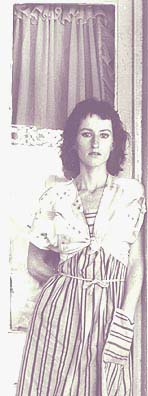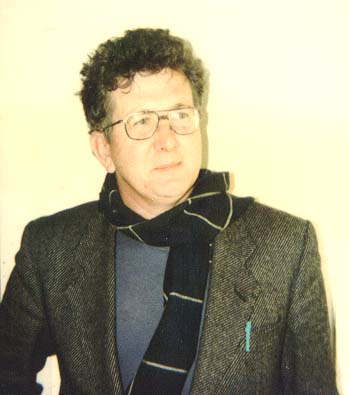|
This eulogy was given by Gig Ryan at a memorial mass for John Forbes at St Brigid’s Church, Fitzroy North, Melbourne, on February 2, 1998.

Gig Ryan, 4 Feb 1982
photograph copyright
© John Tranter, 1982, 1998
|
WITH THE DEATH of John Forbes Australian poetry seems, if possible, even more of a desert than usual. What was astonishing about John was not how he lived or that he died so young, but that he produced so much great work. Even his slightest poems are dense with argument and ideas. For someone who lived so chaotically, his poems are fantastically formal and restrained.
I argued and disagreed with John, mainly about poetry from when we first met in October 1978 up until the day he died, but underlying it all was a mutual respect for each other’s work and a mutual recognition that for us at least, nothing else mattered.
One argument was whether ‘Truth is the only eloquence,’ as I would grandly say, or John’s witty reply that ‘Eloquence is the only truth.’ I always admired John’s work, his intellect, his un-selfconsciousness, his complete lack of acquisitiveness, and now I read his poems, knowing the occasion and circumstance in which many were written, with a shudder of pride and remembrance as if I’d magically produced them myself.
We were all like pygmies in John’s company — pygmies and maybe even parasites, like Dylan’s ‘Name me someone who’s not a parasite / and I’ll go out and say a prayer for him.’ He had an innate innocence in many things, articulating what most of us discreetly hide. But our secretiveness and tact seem shrunken toys compared to his openness and readiness to speak his mind.
His complicated Latinate sentence structures baffled and intrigued me when I first read them, and was too stupid to understand. Now I see the intellectual lucidity, and of course always the humour, as in: Is prevention better than cure? Is Canberra? from his ‘The Joyful Mysteries’.
John’s fascination with Catholicism and the accompanying guilt inducing behaviour was another thing we had in common. We’d often discussed how only those who believed in sin were able to commit sin, but John was an entirely good person, lacking the self-preserving sins of pride and vanity the rest of us get by on. He was generous with his money as only a poor person is, generous with his time and even extravagant with his criticism. He never wavered from his path, and was true to himself, true to his friends and true to his fatal art to the end.
For almost half my life John has exasperated, infuriated, criticised, supported, worried, but above all entertained me, and the world sure looks dull without him.
You can read three poems by Gig Ryan
in Jacket # 4.
|


